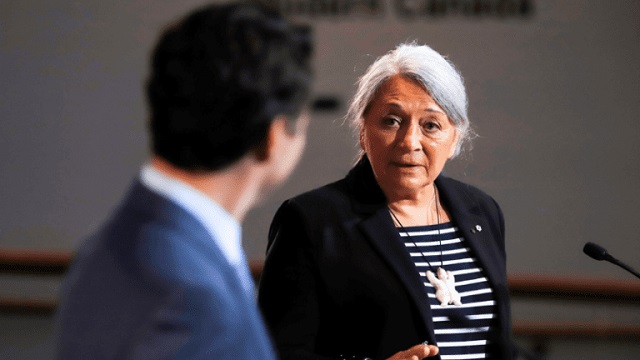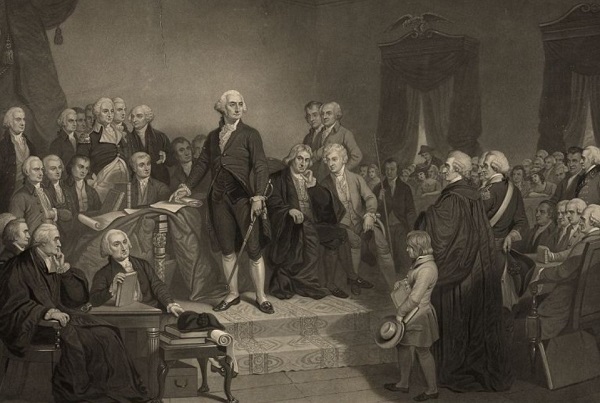MacDonald Laurier Institute
Trudeau is utterly determined to control the media: Peter Menzies

From the MacDonald Laurier Institute
By Peter Menzies
The government has broken new ground by involving itself in the business of judging the journalistic bona fides of news organizations.
The most progressive government in Canada’s history – the one under the towering command of Prime Minister Justin Trudeau – is fast building a reputation as the least liberal administration to have ruled the nation.
Just ask no less a personality than Piers Morgan.
“If you take Trudeau, for example, he banged on about Trump being a fascist, when he is the number one woke fascist in the world,” the English broadcaster and TV presenter recently told America’s Fox News. “The most woke human being alive.”
There’s little question Trudeau’s image as the world’s postmodern Prince Charming took a sharp turn for the worse two years ago with the unprecedented invocation of the Emergencies Act to suppress anti-government protests.
What’s more unsettling for civil libertarians is the thought that the Emergencies Act invocation wasn’t an aberration but part of a pattern of behaviour indicating that, while the ruling party may be Liberal, its instincts are anything but.
Its determination to control media – a hallmark of authoritarianism – has certainly raised eyebrows.
The Online Streaming Act, for instance, was only supposed to be about getting “money from web giants” such as Netflix and Disney+ to ensure government-preferred Canadian film and television content continued to be produced. But the act gave the Canadian Radio-television and Telecommunications Commission (CRTC) sweeping powers over any audio or video content published on the internet, even including podcasts.
Fears were also raised that YouTube and TikTok would be forced by the CRTC to give preferential treatment to its approved content over that produced by those not subscribing to regulatory and Canada Media Fund expectations. The fact the CRTC is involved has further raised fears about the potential for a wave of censorship.
The regulator insists that it does not engage in censorship. But the fact it was doing exactly that – sanctioning Radio Canada for using the N-word and banning RT (Russian State television) while swearing that it wasn’t a censor – didn’t build public confidence in the credibility of its protestations.
When the CRTC accepted a complaint from Egale Canada (a 2SLGBTQI advocacy group) asking that it remove Fox News from its list of approved foreign broadcasters for “repeatedly and regularly” violating broadcasting standards, it was clear that the CRTC is open to making decisions on what Canadians may or may not watch. In other words: censorship. The Commission is composed of a chair, two vice chairs and six regional commissioners, each of whom is appointed by cabinet.
The government has also broken new ground by involving itself in the business of judging the journalistic bona fides of news organizations. Two programs initially announced as temporary – the Local Journalism Initiative and the Journalism Labour Tax Credit – have now doubled in size and appear to be permanent. A government-appointed panel decides which organizations are Qualified Canadian Journalism Organizations (and which aren’t). And while all involved insist the panel functions independently, it nevertheless reports to the Heritage Minister who reports to the Prime Minister’s Office which reports to a prime minister who appears obsessed with the need to control “misinformation” and “disinformation.”
That issue could very well be at the heart of what could become the Trudeau government’s most illiberal legislation yet – the Online Harms Act.
First promised in 2019 to ensure a suite of already-illegal behaviours including child porn and terrorism recruitment were suppressed, the Act’s core concept of giving a Digital Safety Commissioner power to order swift content removal has met with stiff resistance.
Pre-Elon Musk Twitter (X) put it this way:
“People around the world have been blocked from accessing Twitter and other services in a similar manner as the one proposed by Canada by multiple authoritarian governments (China, North Korea, and Iran for example) …”
Three Heritage Ministers have failed to find a way to legally reign in the internet in a fashion that satisfies the prime minister, so the matter has passed to the hands of Justice Minister Arif Virani.
Speculation in Ottawa is that Virani may be named as a Minister of State for Heritage, permitting him to try to come up with legislation that won’t – as did the Online Streaming Act and the Online News Act – trigger outrage when it’s introduced in the spring.
It remains to be seen if the Act will include extreme measures, like the policy resolution passed at last May’s Liberal convention to ban online media from using unnamed sources.
So, strap yourself in. The curtain may be about to rise on the most illiberal Liberal move yet.
Business
Proposed changes to Canada’s Competition Act could kneecap our already faltering economy

From the Macdonald Laurier Institute
Aaron Wudrick, for Inside Policy
No party wants to be seen as soft on “big business” but that is a bad reason to pass potentially harmful, counterproductive competition policy legislation.
The recent federal budget was widely panned – in particular by the entrepreneurial class – for its proposal to raise the capital gains inclusion rate. As it turns out, “soak the rich” might sound like clever politics (it’s not) but it’s definitely a poor narrative if your goal is to incentivize and encourage risk-taking and investment.
But while this damaging measure in the federal budget has at least drawn plenty of public ire, other harmful legislative changes are afoot that are getting virtually no attention at all. They’re contained in Bill C-59 – the omnibus bill still wending its way through Parliament to enact measures contained in last fall’s economic statement – and consist of major proposed amendments to Canada’s Competition Act. The lack of coverage and debate on these changes is all the more concerning given that, if enacted, they could have a long-term negative impact on our economy comparable to the capital gains inclusion rate hike.
Worst of all, the most potentially damaging changes weren’t even in the original bill, but were brought forward by the NDP at the House of Commons Standing Committee on Finance, and are lifted directly from a previous submission made to the committee by the Commissioner of Competition himself. In effect, they would change competition law to put a new onus on businesses to prove a negative: that having a large market share isn’t harmful to consumers.
MPs on the committee have acknowledged they don’t really understand the changes – they involve a “concentration index” described as “the sum of the squares of the market shares of the suppliers or customers” – but the government itself previously cast doubt on the need for this additional change. It’s obvious that a lot of politics are at play here: no party wants to be seen as soft on “big business.” But this is about much more than “big business.” It’s about whether we want to enshrine in law unfounded, and potentially very harmful, assumptions about how competition operates in the real world.
The changes in question are what are known in legal circles as “structural presumptions” – which, as the name implies, involve creating presumptions in law based on market “structure” – in this case, regarding the concentration level of a given market. Presumptions in law matter, because they determine which side in a competition dispute – the regulatory authority, or the impugned would-be merging parties – bears the burden of proof.
So why is this a bad idea? There are at least three reasons.
First of all, the very premise is faulty: most economists consider concentration measures alone (as opposed to market power) to be a poor proxy for the level of competition that prevails in a given market. In fact, competition for customers often increases concentration.
This may strike most people as counterintuitive. But because robust competition often leads to one company in particular offering lower prices, higher quality, or more innovative products, those who break from the pack tend to attract more customers and increase their market share. In this respect, higher concentration can actually signal more, rather than less, competition.
Second, structural presumptions for mergers are not codified in the US or any other developed country other than Germany (and even then, at a 40 percent combined share rather than 30 percent). In other words, at a time when Canada’s economy is suffering from the significant dual risks of stalled productivity growth and net foreign investment flight, the amendments proposed by the NDP would introduce one of the most onerous competition laws in the world.
There is a crucial distinction between parliamentarians putting such wording into legislation – which bind the courts – and regulatory agencies putting them in enforcement guidelines, which leave courts with a degree of discretion.
Incorporating structural presumptions into legislation surpasses what most advanced economies do and could lead to false negatives (blocking mergers that would, if permitted, actually benefit consumers), chill innovation (as companies seeking to up their game in the hopes of selling or merging are deterred from even bothering), and result in more orphaned Canadian businesses (as companies elect not to acquire Canadian operations on global transactions).
Finally, the impact on merger review will not be a simplification but will likely just fetter the discretion and judgment of the expert and impartial Competition Tribunal in determining which mergers are truly harmful for consumers and give more power to the Competition Bureau, the head of which is appointed by the federal Cabinet. Although the Competition Bureau is considered an independent law enforcement agency, it must still make its case before a court (the Tribunal, in this case).The battleground at the Tribunal will shift from focusing on the likely effect of the merger on consumers to instead entertaining arguments between the Bureau’s and companies’ opposing arguments about defining the relevant market and shares.
Even if, after further study, the government decided that rebuttable structural presumptions are desirable, C-59 already repeals subsection 92(2) of the Competition Act, which allows the Tribunal to develop the relevance of market shares through case law – a far better process than a blanket rule in legislation. Nothing prevents the Bureau from incorporating structural presumptions as an enforcement screen for mergers in its guidelines, which is what the United States has done for decades, rather than putting strict (and therefore inflexible) metrics into statute and regulations.
No one disputes that Canada needs a healthy dose of competition in a wide range of sectors. But codifying dubious rules around mergers risks doing more harm than good. In asking for structural presumptions to be codified, the Competition Bureau is missing the mark. Most proposed mergers that will get caught by these changes should in fact be permitted on the basis that consumers would be better off – and the uncertainty of being an extreme outlier on the global stage in terms of competition policy will create yet another disincentive to start and grow businesses in Canada.
This is the opposite of what Canada needs right now. Rather than looking for ill-advised shortcuts that entangle more companies in litigation and punt disputes about market definition rather than effects to the Tribunal, the Bureau should be focusing on doing its existing job better: building evidence-backed cases against mergers that would actually harm Canadians.
Aaron Wudrick is the domestic policy director at the Macdonald-Laurier Institute.
MacDonald Laurier Institute
The Governor General deserves better, but we deserve impartiality

From the Macdonald Laurier Institute
By Philippe Lagassé
Mary Simon’s impartiality was undermined by hosting a symposium tied to controversial government legislation.
Mary Simon has been a guarded Governor General. She’s adopted a low profile since her appointment, performing her vice-regal responsibilities without much notice. When she has been in the news, it’s usually because of her efforts to learn French and costly diplomatic trips, not on account of an initiative she’s launched or a stance she’s taken. Aside from routine public statements and some championing of Indigenous reconciliation, Simon hasn’t tried to make a mark. Until last week, that is.
On April 11, Her Excellency hosted a symposium on online abuse and creating safe digital spaces. Simon has been the target of vitriol on social media, a reality she shares with many public figures, particularly women. She wants to address this problem, stressing that “we deserve better.” As far as causes go, this is a laudable one. Online abuse is a serious issue, one that can excuse and encourage physical violence and attacks. To highlight the severity of the challenge, the Governor General’s symposium featured well-known Canadians who’ve also suffered from online abuse and are determined to fight it.
Unfortunately, the Governor General’s symposium took place while a government bill on online harms is making its way through Parliament. Bill C-63, the Online Harms Act, has been the source of significant controversy, notably around its impact on free expression and the potential life sentences it imposes on certain types of hateful speech. C-63 has been criticized by law professors, civil liberties advocates, and the Conservative Party. While there may be a general consensus that online abuse is a scourge, the solution is contentious, and Bill C-63 has been the subject of serious debate.
As well-intentioned as the Governor General’s symposium was, she should never have hosted it in this context, a conclusion that’s reinforced by the Minister of Justice publicly tying the event to bill C-63. As soon as the government tabled the bill, Her Excellency should have understood that the symposium was no longer appropriate and would present a risk to her office’s impartiality.
The Governor General is the second highest office of the Canadian state, right under the King. As the King’s vice-regal representative, the Governor General performs core constitutional functions. These demand that the Governor General not only act impartially but be perceived to be impartial. This isn’t just good form, it’s a fundamental part of the job.
As part of their constitutional role, Governors General exercise the Crown’s reserve powers. These include the granting of royal assent to legislation on the advice of the houses of Parliament, proroguing and dissolving Parliament on the advice of the Prime Minister, and inviting a party leader to form a new government when the serving Prime Minister resigns. Impartiality helps shield the Governor General from partisan attacks when exercising these powers and maintains public trust in the office.
Now, to be clear, the Governor General has very limited discretion in exercising these reserve powers. As long as the Prime Minister’s party holds the confidence of the House of Commons, the Governor General must almost always accept their advice. Yet, there have been and will be cases where vice-regal representatives exercise their discretion to decide the fates of governments or guard against unconstitutional abuses of power. When these occur, we need the Governor General to be respected as a non-partisan, politically neutral office. Doubts about a Governor General’s impartiality undermine her or his constitutional functions and can weaken trust in the office when it’s most needed.
Turning back to the symposium, it’s important to clarify why it undermined her impartiality, or at least perceptions of it. Defenders of the symposium have argued that the event didn’t feature any members of the government as speakers, hence it wasn’t partisan or meant to endorse the Online Harms Act. Suffice to say, had ministers spoken at the event, we would be dealing with an outright constitutional debacle, not just concerns about vice-regal impartiality. A full-on violation of constitutional norms isn’t the standard here. Instead, we should be asking why the Minister of Justice was even there, and why the Governor General decided to host the symposium, considering how contentious Bill C-63 has been already. Hosting the event allowed Her Excellency to get pulled into the partisan fray, a predictable outcome that she shouldn’t have risked.
Those who participated in the symposium will counter that it was the Minister of Justice who made the connection with Bill C-63, not the Governor General. Her Excellency’s motives, and the importance of the cause addressed by the symposium, shouldn’t be impugned by a careless, partisan tweet. Alas, partisans are going to partisan and politicians are going to politick. This is precisely why vice-regal representatives should avoid wading into politically charged topics. Expecting politicians to show restraint and respect the neutrality of the office of the Governor General is more than a tad naive. Vice-regal representatives should have the wherewithal to avoid situations where their office can be leveraged for partisan purposes.
Defenders of the symposium offer another argument: as the sovereign’s representative, the Governor General should address important social problems that affect Canadians. The vice-regal role shouldn’t be confined to constitutional functions, ceremonies, and commemorations. Not allowing vice-regal representatives to advocate for the public good would be a lost opportunity. This is a fair point, though Governors General need to be careful about what causes they take up. When it comes to vice-regal advocacy, banal benevolence is the way to go. Anything that’s the subject of notable partisan and parliamentary debate, is ideologically fraught, or might be fought over during an election should raise red flags.
Thankfully for the Governor General, the controversy surrounding her symposium hasn’t extended beyond the Ottawa bubble yet. She should keep it that way by abandoning her “We Deserve Better” campaign while partisans battle it out over Bill C-63 and the courts review the Online Harms Act if it becomes law.
This isn’t because the Governor General doesn’t deserve better; she does, as do all those who suffer online abuse. It’s because Canadians deserve impartiality from the Governor General, both real and perceived.
Philippe Lagassé is an associate professor at Carleton University. He’s the co-editor of Canada and the Crown: Essays on Constitutional Monarchy (2014) and The Crown and Parliament(2015).
-

 Brownstone Institute2 days ago
Brownstone Institute2 days agoMedical Elites’ Disgrace Over Ivermectin
-

 COVID-192 days ago
COVID-192 days agoThe New York Times Admits Injuries from COVID-19 Shots
-

 Opinion2 days ago
Opinion2 days agoThe American Experiment Has Gone Down In Flames
-

 Energy1 day ago
Energy1 day agoFederal government continues to reject golden opportunities to export LNG
-

 National22 hours ago
National22 hours agoDespite claims of 215 ‘unmarked graves,’ no bodies have been found at Canadian residential school
-

 Brownstone Institute14 hours ago
Brownstone Institute14 hours agoThe WHO’s Proposed Pandemic Agreements Worsen Public Health
-

 Energy1 day ago
Energy1 day agoBuckle Up for Summer Blackouts: Wind Is Already Failing Texas in Spring
-

 conflict2 days ago
conflict2 days ago‘It Makes No Sense’: Experts Puzzled By Biden Admin’s Claim That Rafah Invasion Wouldn’t Help Israel Defeat Hamas








